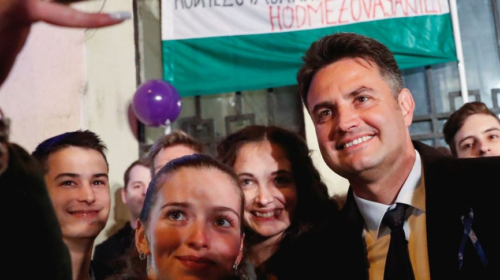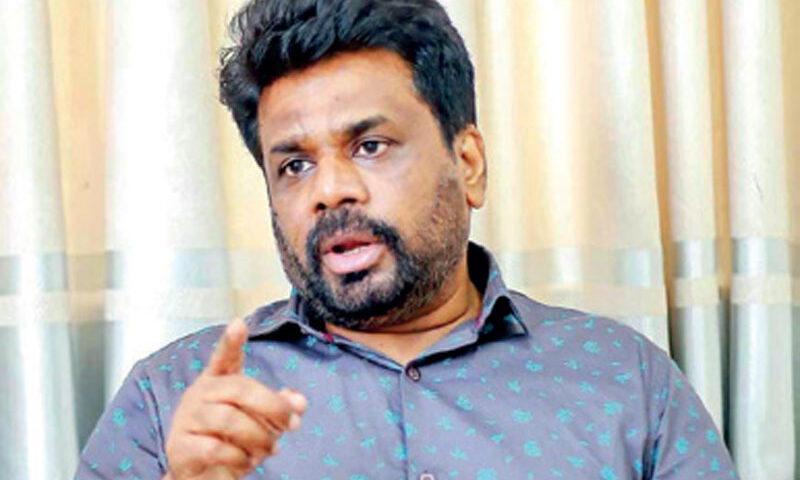Opposition candidate for prime minister Péter Márki-Zay poses for a selfie with supporters
The conservative small-town mayor Péter Márki-Zay has won the primary of Hungary’s united opposition. And he has a good chance of beating Orbán
Small-town mayor Péter Márki-Zay won the run-off election of the first ever Hungarian opposition primary that ended on 17 October. MZP – that is his nickname in Hungarian public discourse – obtained 371,560 votes against Member of European Parliament Klára Dobrev’s 283,677 votes. He will be facing Prime Minister Viktor Orbán in next spring’s parliamentary elections as the leader of the united opposition.

Szilárd Pap is a Hungarian journalist,
Since Orbán’s landslide victory in 2010, the fragmented Hungarian opposition parties have been searching for a solution that would give them at least a fighting chance of defeating the ruling Fidesz party at the ballot box. With Orbán’s reform of Hungary’s electoral law in 2011, he set up a system based primarily on first-past-the-post individual electoral districts favouring a united ruling party, which forced opposition actors into uneasy coalitions. For the last two electoral cycles, the parties struggling against the semi-authoritarian regime of Hungary’s strongman failed at finding a way to tackle their various conflicts and mutual grievances. The results were two supermajorities in parliament for Fidesz.
It took an entire decade for the opposition parties to resolve their disagreements, but they finally managed this year – and organised a primary election to decide on the 106 joint candidates for the individual electoral districts, and on their prime ministerial candidate. Altogether, more than 800,000 citizens turned out to vote in the two rounds of the primary race. That’s ten per cent of the entire Hungarian electorate, a turnout comparable to that of more established primaries like the US presidential ones.
The primaries re-energised democracy
Besides solving the dilemma of how to decide on the candidates of the united opposition, the primaries had several positive side-effects. The unexpectedly high turnout energised opposition voters, it helped parties prepare their campaign machineries for the spring elections, and enabled them to attract public attention for more than a month, puzzling even the usually quite media-savvy governing elite.
More importantly even, the primaries brought back much-needed democratic accountability to Hungarian opposition politics. For more than a decade, the established opposition forces have been in a state of political impotence, unable to effectively challenge the Orbán regime. Opposition voters now had the chance to punish politicians whom they found unimaginative, expired, or outright corrupt. In the race for the 106 individual constituency candidacies, many established politicians with decades-long career as mayors, parliamentarians, or ministers have been defeated by younger faces or outright political newcomers.
The first round of the prime ministerial primary saw quite a few surprises.
Notwithstanding, the results of the contest for individual constituencies also reflected quite accurately the balance of forces among the six opposition parties. The liberal Democratic Coalition (caucusing with the Alliance of Socialists and Democrats (S&D) in the European Parliament) won 32 candidacies, the radical-right-wing-turned-moderate-conservative Jobbik party 29, while the post-communist Socialist Party (also member of the S&D) won 18 races. The Momentum Movement, a young liberal party, member of French President Emmanuel Macron’s Renew Europe faction will put up the common opposition candidate in 15 districts, while the two green parties – Dialogue and Politics Can be Different – won six and five races respectively.
Who is Márki-Zay
In contrast, the first round of the prime-ministerial primary saw quite a few surprises. Jobbik’s leader, Péter Jakab, long considered one of the frontrunners, sank to fourth place, while Momentum’s András Fekete-Győr finished last, widely underperforming the results of the movement’s individual candidates. Shortly afterwards, he was forced to step down from leadership in an internal vote of no confidence.
Democratic Coalition’s Klára Dobrev came in first, followed by Budapest mayor, Gergely Karácsony and Péter Márki-Zay in second and third places, respectively. Karácsony, the presumptive nominee of the opposition for the last two years, ran a spectacularly weak campaign, and was forced to drop out of the second round by the energetic MZP. One day before the second round began, the green-left mayor of Budapest endorsed Márki-Zay.
Márki-Zay’s unexpected success can partly be explained by the opposition electorate’s dissatisfaction with the elites who represented them throughout the last ten years. A self-defined Christian and Conservative, MZP ran on a strongly anti-establishment platform, promising to ‘clean’ the opposition and push to the background its discredited politicians. Since February 2018, Márki-Zay has been the mayor of Hódmezővásárhely, a Fidesz stronghold with a population of 44,000 in the southeast of Hungary. Back then, his candidacy was supported by all the opposition parties, foreshadowing the united front that brought relative successes for them in the local elections of October 2019, and that is widely regarded as the recipe for defeating Orbán.
Who are Péter Márki-Zay and Klára Dobrev?
Márki-Zay is an idiosyncratic political character with several policy positions closer to Fidesz’s than to those of the median opposition voter. His rhetorical style shows similarities with Donald Trump’s long, incoherent streams of consciousness, and he displays an affinity to conspiracy theories and tabloid-style statements. Many of his remarks are criticised even by opposition pundits, such as the claim that half of the members of the current government could be gay, and so could the son of Orbán himself.
By defining himself in opposition to the Dobrev-Gyurcsány duo and the old liberal elites, Márki-Zay tapped into Hungarians’ dissatisfaction with an impotent opposition.
Márki-Zay’s anti-establishment credentials were also propped up by his counterpart in the second round, Klára Dobrev. Brought up in an influential communist nomenklatura dynasty, married to former prime minister Ferenc Gyurcsány, and currently serving as Vice-President of the European Parliament, Dobrev is the epitome of the ‘establishment’.
Her party, the Democratic Coalition, is widely regarded as the most disciplined group within the opposition, with a devout base of followers, and relatively better infrastructure. All these factors, along with her undeniable professionalism and political charisma, boosted Dobrev’s chances in the primary. Her biggest political baggage, however, is her husband Ferenc Gyurcsány, one of the most disliked politicians in Hungary. Prime minister between 2004 and 2009, Gyurcsány’s name is still inseparable from the economic disaster and austerity politics of the late 2000s, the neoliberalisation of Hungarian social democracy, and an infamous leaked speech from 2006, in which he admits to lying to the electorate. This speech, the protest wave that ensued the publication of the speech, and the police brutality that followed the protests together represented the last nail in the coffin of the Third Hungarian Republic, and paved the way to Orbán’s authoritarian turn.
By defining himself in opposition to the Dobrev-Gyurcsány duo and the old liberal elites, Márki-Zay tapped into Hungarians’ dissatisfaction with an impotent opposition. Around 200,000 people, many of them young, turned out for the second round, despite staying at home in the first one, seeing hope in the political character of MZP. The candidate won with huge margins among online voters as well.
A crisis of representation
Besides his anti-establishment bona fides, Márki-Zay also appealed to opposition voters by emphasising Fidesz’s inability to place him in the usual political dichotomies that, in the rhetoric of the ruling party, pit the ‘pro-national’ right against the ‘anti-national’, ‘treasonous’, ‘cosmopolitan’ liberals. Granted, during the month of the primary season, Fidesz spent more than €1,000,000 on ads driving home the message that these primaries are just a farce organised by Gyurcsány, with both Dobrev and Karácsony as his candidates. Now, surprised by the result, the government’s propaganda machine is trying to recalibrate their messaging to the person Márki-Zay, but with little prospects of success.
In many respects, then, he is the first person in a decade to have some realistic chances of actually defeating Viktor Orbán at the ballot box.
The newly elected prime ministerial candidate also mixes, with almost natural ease, anti-Orbán populism and a technocratic rhetoric reminiscent of the neoliberal centre in the 1990s. By opposing progressive taxation and committing to strict fiscal discipline, the conservative politician plays to the biases of Hungarian (neo)liberal intelligentsia, while his pro-LGBT and pro-Roma statements also appeal to large portions of younger progressives.
In this sense, Márki-Zay is a new kind of techno-populist politician. He is at once a symptom of Hungarians’ distrust in political representation, and for many, a solution to the very same crisis of representation. His idiosyncratic messaging and general lack of political depth makes him an ideal canvass for many Hungarians to project their frustrations and hopes on.
In many respects, then, he is the first person in a decade to have some realistic chances of actually defeating Viktor Orbán at the ballot box. He faces, however, an uphill battle, not just because the entire electoral system and state institutions are tailored to keep Fidesz in power, but also because of the fragmentation of the opposition. Márki-Zay will have a hard time keeping together the diverse opposition actors, many of whom have an axe to grind against him, while also fighting Fidesz’s campaign machine fuelled by billions of state funds. His relative lack of political experience also makes him prone to gaffes.
Undoubtedly, Péter Márki-Zay is an instinctual reader of the European and global political zeitgeist, a political leader in sync with the current mood of voters fed up with political elites not representing them properly. At the same time, political characters experiencing such a meteoric rise, but without political depth and an effective party machinery, are highly susceptible to quick political deflation. It remains to be seen whether he can live up to the high expectations that a spectacularly large portion of mobilised citizens projected onto him.



